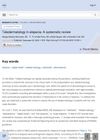 March 2023 in “International journal of trichology”
March 2023 in “International journal of trichology” Six genetic conditions are often linked to complete scalp hair loss in children.
 November 2023 in “Clinical, Cosmetic and Investigational Dermatology”
November 2023 in “Clinical, Cosmetic and Investigational Dermatology” Saw palmetto extract reduced hair loss and improved hair growth in people with hair thinning.
 4 citations,
July 2022 in “Journal of health economics and outcomes research”
4 citations,
July 2022 in “Journal of health economics and outcomes research” Alopecia areata in US adolescents leads to significant healthcare costs and usage.
 April 2024 in “Dermatology and therapy”
April 2024 in “Dermatology and therapy” There are significant gaps and inconsistencies in diagnosing and treating alopecia areata in Greece and Italy.
 December 2023 in “JAAD international”
December 2023 in “JAAD international” Teledermatology is highly effective for diagnosing and managing hair loss.
 2 citations,
November 2023 in “Acta dermato-venereologica”
2 citations,
November 2023 in “Acta dermato-venereologica” Tofacitinib is effective and safe for treating alopecia areata with a good drug survival rate.
 March 2024 in “Clinical and experimental dermatology”
March 2024 in “Clinical and experimental dermatology” Topical corticosteroids may be a safe and effective treatment for severe alopecia areata in children.
January 2025 in “Advances in experimental medicine and biology”  6 citations,
March 2022 in “Frontiers in drug discovery”
6 citations,
March 2022 in “Frontiers in drug discovery” Some small molecule antivirals show promise against COVID-19, but more research is needed to understand and improve them.
 July 2022 in “JEADV Clinical Practice”
July 2022 in “JEADV Clinical Practice” The document concludes that different types of permanent hair loss conditions are related and early treatment is key to preventing further damage.
 April 2023 in “Medizinische Genetik”
April 2023 in “Medizinische Genetik” New research has found 14 genes linked to the risk of developing alopecia areata, improving understanding and treatment options.
7 citations,
July 2021 in “JAAD case reports” Dupilumab may help treat alopecia areata in children with atopic dermatitis, but it can also cause new hair loss.
 January 2024 in “JEADV clinical practice”
January 2024 in “JEADV clinical practice” Patients were highly satisfied with shared medical appointments for hair loss treatment.
 30 citations,
September 2020 in “Journal of Patient-Reported Outcomes”
30 citations,
September 2020 in “Journal of Patient-Reported Outcomes” Alopecia Areata (AA) causes significant emotional distress, including feelings of embarrassment, depression, and anxiety, and impacts social interactions and daily activities.
19 citations,
January 2021 in “Journal of the American Academy of Dermatology” Dupilumab may help children with alopecia areata and atopic dermatitis regrow hair.
 11 citations,
March 2020 in “Cellular Signalling”
11 citations,
March 2020 in “Cellular Signalling” XIST RNA helps regenerate hair follicles by targeting miR-424 and activating hedgehog signaling.
2 citations,
February 2024 in “International journal of molecular sciences” Gut health affects skin diseases, and probiotics might help.
2 citations,
April 2023 in “Polymers” The study created 3D-printed pills that effectively release a hair loss treatment drug over 24 hours.

There are many treatments for common hair loss, but more trials are needed to decide which are best.
 June 2020 in “Journal of Investigative Dermatology”
June 2020 in “Journal of Investigative Dermatology” Getting insurance to cover the hair loss treatment tofacitinib is hard because it's not officially approved for that use.
 February 2024 in “International Journal of Molecular Sciences”
February 2024 in “International Journal of Molecular Sciences” Hair loss in Androgenetic Alopecia is caused by genetics, aging, and lifestyle, leading to hair follicle shrinkage and related health risks.
 2 citations,
October 2015 in “Human Gene Therapy”
2 citations,
October 2015 in “Human Gene Therapy” The congress highlighted new gene therapy techniques and cell transplantation methods for treating diseases.
44 citations,
April 2019 in “Journal of the American Academy of Dermatology” Cyclosporine showed some improvement in alopecia areata but results were not statistically significant.
April 2024 in “Tạp chí Y học Thảm hoạ và Bỏng” Choosing the right treatment for hair loss is complex and depends on effectiveness, side effects, practicality, and cost.
 6 citations,
July 2022 in “Journal of health economics and outcomes research”
6 citations,
July 2022 in “Journal of health economics and outcomes research” Adolescents with severe alopecia incur significantly higher healthcare costs.
 7 citations,
May 2020 in “Dermatologic Therapy”
7 citations,
May 2020 in “Dermatologic Therapy” Dermatologists helped identify COVID-19 through skin symptoms and managed skin issues during the pandemic, but more high-quality research is needed.
 2 citations,
October 2022 in “The journal of investigative dermatology/Journal of investigative dermatology”
2 citations,
October 2022 in “The journal of investigative dermatology/Journal of investigative dermatology” AIRE deficiency causes hair loss similar to alopecia areata in mice.
 22 citations,
August 2017 in “Stem cells and cloning”
22 citations,
August 2017 in “Stem cells and cloning” Stem cell technologies and regenerative medicine, including platelet-rich plasma, show promise for hair restoration in treating hair loss, but more research is needed.
 13 citations,
April 2020 in “Experimental Cell Research”
13 citations,
April 2020 in “Experimental Cell Research” PCAT1 helps hair growth by controlling miR-329/Wnt10b.
 April 2024 in “Dermatology and therapy”
April 2024 in “Dermatology and therapy” In Denmark from 1995 to 2016, hospital-treated alopecia areata cases increased, mostly affecting women and those over 50.























